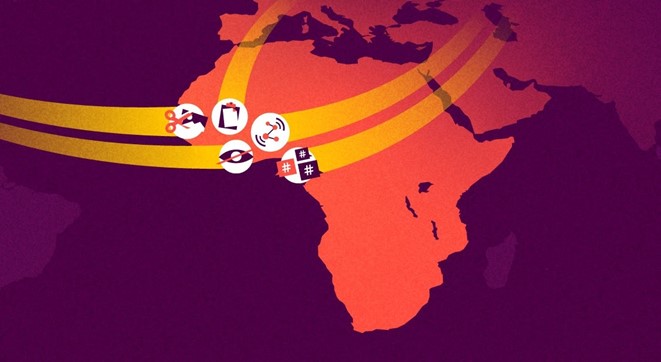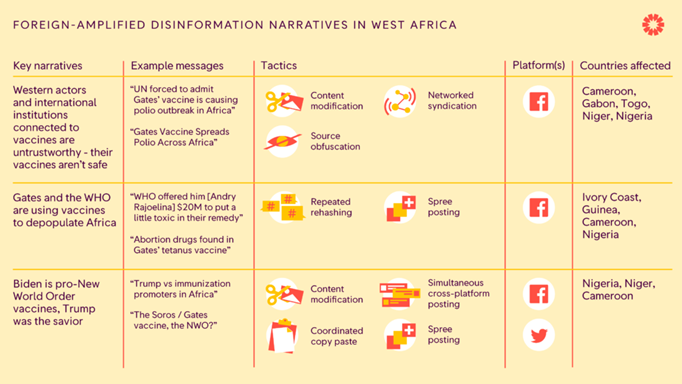COVID-19: ‘Fake News’ From US, Others Undermining Vaccination Efforts In W. Africa
“Foreign narratives and conspiracy theories are gaining ground in West Africa, further eroding trust in institutions in the region,” the non-profit observed.

Misleading claims that originated from foreign countries such as the United States and Russia are making their way to audiences in West Africa and increasing people’s reluctance to get vaccinated, a new study has found out.
First Draft, a non-profit coalition set up to fight online misinformation, discovered this trend from recent research and presented its findings in a report published on Wednesday, June 23, 2021.
“Foreign narratives and conspiracy theories – initially developed and popularised in North America – are taking hold in West Africa, further eroding trust in institutions in the region,” noted the authors, senior data journalist, Carlotta Dotto and research analyst, Seb Cubbon.
The findings highlight the urgent need to combat these falsehoods moving through social media in West African countries. Left unaddressed, they have the potential to disrupt vaccination efforts in the region, the authors observed.
“The use of disinformation tactics to spread anti-vaccine messages underlines the need for platforms to not only focus their efforts on fact-checking, but also to identify the use of specific methods to more effectively prevent harmful content from being spread,” they recommended.
The report traced anti-vaccine contents being spread in the sub-region to American anti-science websites, Pro-Russian disinformation networks, French disinformation websites, European conspiracy theorists, among others. These contents enjoy a wide readership on Facebook and other social networks.

First Draft warned that the messages “are amplifying wider narratives that could erode trust in key actors and institutions connected to vaccines.”
“North American and European conspiracy theories are reaching both Anglophone and Francophone West Africa on social media and are a key feature of online vaccine misinformation in the region,” the report said.
“These include conspiracy theories about depopulation programs, a totalitarian, one-world government known as the New World Order, and even certain elements of QAnon, such as the idea that former US President Donald Trump was secretly fighting a corrupt political and financial establishment.”
The conspiracy theories typically present organisations such as the United Nations (UN) and World Health Organization (WHO) and people like Bill Gates as “corrupt and ill-intended.”
“Mistrust in institutions continues to be strongly associated with vaccine refusal in many African countries,” the study concluded.
The researchers advised that identifying problematic social media behaviour should be prioritised above moderating individual contents.
“Content moderation can reduce the visibility of harmful misinformation in the short run. But disinformation networks are resilient and adaptive. They will continue to employ sophisticated tactics to spread their harmful content. By refocusing moderation efforts on tracking suspicious behavior and implementing measures to curb bad actors’ dissemination tactics, platforms may be able to limit the reach of disinformation in the long run,” they explained.
They urged that fact-checking efforts should be applied consistently across regions and languages, noting that Facebook’s third-party verification programme did not regulate a lot of the misinformation identified during the study.
“Messaging that can address deep-seated issues of trust with actors and institutions connected to vaccines is key. The political nature of the most dominant vaccine narratives on West African social media highlights the importance of rebuilding trust in vaccine institutions and depoliticizing them,” they continued.
“We need to build bridges between health experts and institutions and vaccine-hesitant populations. Finding a way for health experts and institutions to connect with those questioning Covid-19 vaccines without validating or amplifying concerns will be a fundamental component of rebuilding.”
Support Our Journalism
There are millions of ordinary people affected by conflict in Africa whose stories are missing in the mainstream media. HumAngle is determined to tell those challenging and under-reported stories, hoping that the people impacted by these conflicts will find the safety and security they deserve.
To ensure that we continue to provide public service coverage, we have a small favour to ask you. We want you to be part of our journalistic endeavour by contributing a token to us.
Your donation will further promote a robust, free, and independent media.
Donate HereStay Closer To The Stories That Matter




